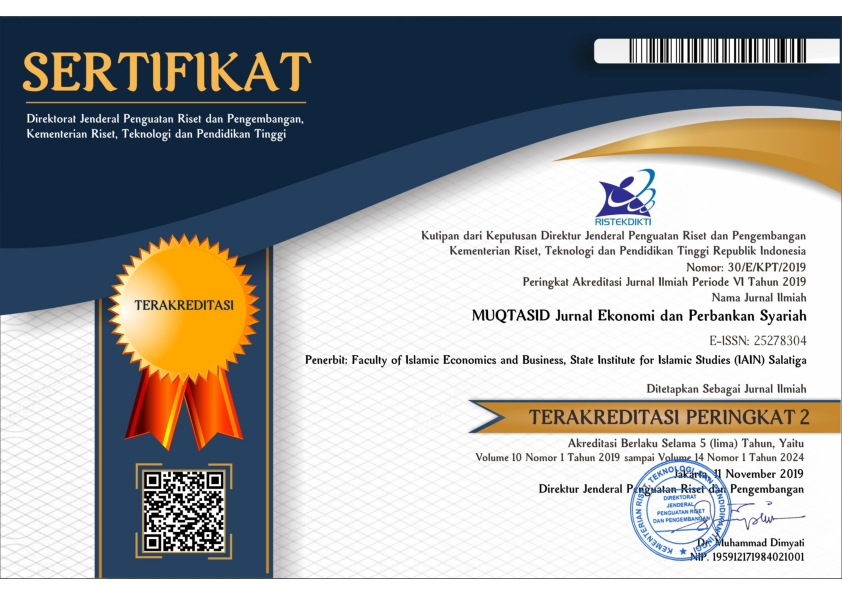The Effect of the Maqashid Sharia Index, Company Size, and Company Age on Islamic Social Reporting
Abstract
Islamic social reporting is the application of social functions that are based on sharia provisions. It does not only help the Muslims in deciding but also helps companies to fulfill their obligations to God and the community. This study aims to obtain empirical evidence on the influence of maqashid sharia index, company size, and company age on Islamic social reporting and the example is the 11 sharia banks in Indonesia. This study takes about 4 years (2015-2018) and the analysis technique was a descriptive and statistical analysis. Statistical analysis uses the Partial Least Square approach (Smartpls version 3.0) and the result is indicated that the maqashid sharia index, company size, and company age have a positive effect on Islamic social reporting. This study empirically proves that a sharia bank that is able to express the maqashid sharia index well then has good Islamic social reporting disclosure. The sharia banks that have high total assets and income tends to make an extensive Islamic social reporting disclosures because there are also more sources of funds used to make disclosures. The longer sharia bank is established, the higher level of Islamic social reporting disclosure.
Keywords
Full Text:
PDFReferences
Deegan, C. 2002. Introduction: The Legitimising Effect of Social and Environmental Disclosure – A Theoritical Foundation. Accounting, Auditing, and Accountability Journal, 5(3), 282 - 311.
Dewi, A. S. M., & Wirajaya, A. (2013). Pengaruh Struktur Modal, Profitabilitas, dan Ukuran Perusahaan Pada Nilai Perusahaan. E-Jurnal Akuntansi, 4(2), 358-372.
Dienes, D., & Velte, P. (2016). The Impact of Supervisory Board Composition on CSR Reporting: Evidence from the German Two-Tier System. Sustainability, 8(63), 1-20.
Firdaus, I. (2017). Pengaruh Kinerja Keuangan, Kepemilikan Institusional, Ukuran Dewan Pengawas Syariah, Leverage Terhadap Pengungkapan Islamic Social Reporting Pada Perbankan Syariah di Indonesia. JOM Fekon, 4(1), 3095-3109.
Fitria, S., & Hartanti. (2010). Islam dan Tanggung Jawab Sosial: Studi Perbandingan Pengungkapan Berdasarkan Global Reporting Initiative Indeks dan Islamic Social Reporting Indeks. Simposium Nasional Akuntansi XIII.
Ghazali, I., & Latan, H. (2015). Partial Least Squares: Konsep, Teknik dan Aplikasi Menggunakan SmartPLS 3.0, Edisi 2. Semarang: Universitas Diponegoro.
Hadi, N. (2009). Social Responsibility: Kajian Theoratical Framework dan Perannya dalam Riset di bidang Akuntansi. Akses: Jurnal Ekonomi & Bisnis, 4(8), 88-109. doi: 10.31942/akses.v4i8.517.
Hair, J. F., Anderson, R. E., Tatham, R. L., & Black, W. C. (2011). Multivariate Data Analysis, Fifth Edition. New Jersey: Prentice Hall, Inc.
Haniffa, R. (2002). Social Reporting Disclosure An Islamic Perspective. Indonesian Management & Accounting Research, 38(3), 128-146.
Haniffa, R., & Hudaib, M. (2007). Exploring Rhe Ethical Identity Of Sharia bank Via Communication In Annual Reports. Journal of Business Ethics, 76, 97-116. DOI: https://doi.org/10.1007/s10551-006-9272-5.
Jazil, T., & Syahruddin. (2013). The Performance Measures of Selected Malaysian and Indonesian: Islamic Banks based on the Maqasid al-Shari'ah Approach. Jurnal Hukum dan Ekonomi, 7(2), 279-301.
Juhmani, O. (2014). Determinants of Corporate Social and Environmental Disclosure on Websites: the Case of Bahrain. Universal Journal of Accounting and Finance, 2(4), 77 - 87.
Kholid, M. N., & Bachtiar, A. (2015). Good Corporate Governance dan Kinerja Maqashid Syariah Bank Syariah di Indonesia. Jurnal Akuntansi dan Auditing Indonesia, 19(2): 126-136. DOI: https://doi.org/10.20885/jaai.vol19.iss2.art4.
Lestari, P. (2013). Determinants of Islamic Social Reporting In Syariah Banks: Case of Indonesia. International Journal of Business and Management Invention, 2(10), 28-34.
Lestari, S. (2016). Pengaruh Tingkat Profitabilitas, Likuiditas, Leverage, Ukuran Perusahaan dan Umur Perusahaan Terhadap Pengungkapan Islamic Social Reporting Pada Perbankan Syariah Indonesia Tahun 2010-2014. Jurnal Akuntansi Akunesa, 4(2), 1-24.
Maali, B., Casson, P., & Napier, C. (2006). Social Reporting by Islamic Banks. Abacus, 42(2), 266-289.
Mohammed, M. O., Razak, D. A., & Taib, F. Md. (2008). The Performance Measures of Islamic Banking Based on The Maqashid syariah. Proceeding IIUM International Accounting Conference (INTAC IV).
Mohammed, M. O., & Taib, F. Md. (2015). Developing Islamic Banking Performance Measures Based on Maqasid Al-Shari'ah Framework: Cases of 24 Selected Banks. Journal of Islamic Monetary Economics and Finance, 1(1), 55-77.
Mohammed, M. O., Tarique K. Md., & Islam, R. (2015). Measuring the Performance of Islamic Banks using Maqasid-Based Model. Intellectual Discourse, 23, 401-424.
Rama, A., & Meliawati. (2014). Analisis Determinan Pengungkapan Islamic Social Reporting. Equilibrium, 2(1), 84-103.
Salman, K. R., Anshori, M., & Tjaraka, H. (2018). New Evidence on the Direct and Indirect Influence on the Maqashid Sharia Index on the Islamic Social Reporting Index. International Journal of Research Science and Management, 5(8), 165-173. doi:10.5281
Saoqi, A. A. (2017). Analyzing The Performance of Islamic Banking In Indonesia and Malaysia: Maqashid Index Approach. Jurnal Ekonomi Islam, 8(1), 29-50.
Sunarsih, U., & Ferdiyansyah. (2017). Determinants of the Islamic Social Reporting Disclosure. Al-Iqtishad: Jurnal Ilmu Ekonomi Syariah, 9(1): 69-80.
Syukron, A. (2013). Dinamika Perkembangan Perbankan Syariah di Indonesia. Economics: Jurnal Ekonomi dan Hukum Islam, 3(2), 28-53.
Othman, R., Thani, A. Md., & Ghani, E. K. (2009). Determinants of Islamic Social Reporting Among Top Shariah-Approved Companies in Bursa Malaysia. Research Journal of International Studies, 12(12), 4-20.
Othman, R., & Thani, A. Md. (2010). Islamic Social Reporting of Listed Companies in Malaysia. International Business & Economics Research Journal, 9(4): 135-144.
Ummiyati, & Baiquni, M. D. (2018). Ukuran Perusahaan, Profitabilitas, dan Leverage Terhadap Islamic Social Reporting Pada Bank Umum Syariah di Indonesia. Jurnal Akuntansi dan Keuangan Islam, 6(1), 85-104.
Utami, S., & Prastiti, S. D. (2011). Pengaruh Karakteristik Perusahaan Terhadap Social Disclosure. Jurnal Ekonomi Bisnis, 16(1), 63-69.
Usman, A., & Khan, M. K. (2012). Evaluating the Financial Performance of Islamic and Conventional Banks of Pakistan: A Comparative Analysis. International Journal of Business and Social Science, 3(7), 253-257.
Wiyuda, A., & Pramono, H. (2017). Pengaruh Good Corporate Governance, Karakteristik Perusahaan terhadap Luas Pengungkapan Corporate Social Responsibility pada Perusahaan Terdaftar di BEI. Kompartemen, 15(1), 12-25.
(2019, March 15). Retrieved
from Statistik Perbankan Tahun 2019: www.ojk.go.id
DOI: https://doi.org/10.18326/muqtasid.v11i2.117-132
Refbacks
- There are currently no refbacks.

MUQTASID by http://muqtasid.iainsalatiga.ac.id/ is licensed under a Creative Commons Attribution-ShareAlike 4.0 International License.
MUQTASID Jurnal Ekonomi dan Perbankan Syariah UIN SALATIGA p-ISSN: 2087-7013, e-ISSN: 2527-8304





